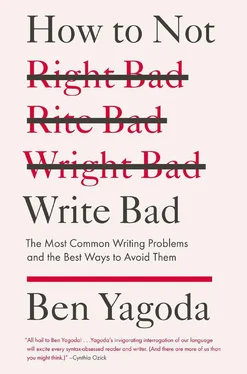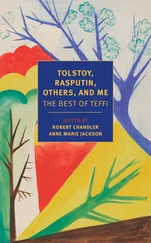Writing concisely is both selfish and generous. It’s generous because it contains an implicit acknowledgment that the reader’s time is valuable and that you do not intend to waste it. It’s selfish because, compared to verbosity, it is a much more effective way to get your point across.
Admittedly, it takes a good deal of time and effort to achieve. It’s much easier to write long than to write short. You could call it the Dickens Fallacy: somehow, we all seem to have an ingrained sense that we’re being paid by the word. Once you get that excessive sentence down, then examining it for those needless words is laborious in itself. And when you’ve spotted them, you generally can’t just pluck them out and be done with it; the sentence has to be reshaped. But all this has always been the case.
Below are some pieces of verbosity from students’ work, with edits.
[ The book compiles fifty-two pieces of work from forty-five different writers each and every one of whom has a special connection to the tiny state of Delaware. ]
The book has fifty-two pieces of work from forty-five writers, each with a Delaware connection.

[ Cromartie hopes students leave the presentations with a better appreciation and understanding of the people of Uganda, the strife they are living with daily and the impoverished conditions from which they are trying to rise above through the education of children and vocational training for adults. ]
Cromartie said he hoped students would leave the presentations with a better understanding of both the people of Uganda and the efforts they’re making to improve the terrible conditions there.

[ City council members expressed inspections are to insure the healthy living environments residing within rental properties as well as to protect the city from future incidents. ]
That one combines wordiness with vagueness. It’s missing information, and I have used my poetic license to provide it.
Two city council members made the point that inspections are important, both to promote the health of residents and to protect the city from lawsuits.

[ In an age that could not have even anticipated news being spread via the Internet, broadcast journalism took the media world by storm and allowed reporters to pledge their allegiance through trustworthy pieces aimed to satisfy the public interest. ]
In the 1950s and ’60s, broadcast journalism became more popular and effective.

[ Not only do journalists possess an undying passion to uncover and showcase relevant information to enhance the public’s knowledge on current events, but exhibit a willingness to go to great lengths to obtain stories fit to print. ]
The best journalists are passionate about their work and indefatigable in tracking down stories.
5. THE PERILS OF AMBIGUITY
a. Crash Blossoms
In a New York Times Magazine “On Language” column in 2010, Ben Zimmer described how Mike O’Connell, an American editor based in Japan, was bemused by an article in a local newspaper about the successful musical career of a young musician whose father had died in a 1985 Japan Airlines plane crash. Specifically, he was bothered by the headline — VIOLINIST LINKED TO JAL CRASH BLOSSOMS — which made him wonder, “What’s a crash blossom?” O’Connell and another editor, Dan Bloom, thereupon coined Crash Blossoms as a term for such vexingly ambiguous headlines. Zimmer listed some prime examples:
[MCDONALD’S FRIES THE HOLY GRAIL FOR POTATO FARMERS]
[BRITISH LEFT WAFFLES ON FALKLANDS]
[GATOR ATTACKS PUZZLE EXPERTS]
And two all-time greats, used by the Columbia Journalism Review for its collections of misleading headlines:
[SQUAD HELPS DOG BITE VICTIM]
[RED TAPE HOLDS UP NEW BRIDGE]
The classic Crash Blossom is born out of the compression demanded by headlines, and the confusion can often be eliminated by adding missing words or changing the verb from present tense to something more appropriate:
MCDONALD’S FRIES ARE THE HOLY GRAIL…
THE BRITISH LEFT IS WAFFLING…
ALLIGATOR ATTACKS ARE PUZZLING EXPERTS
b. If Only English Were German
But Crash Blossoms are not limited to headlines. The English language has a lot of tricks up its sleeve, and once a sentence gets beyond a “See Dick run” level of complexity, the ordering of the elements within it takes on a crucial strategic importance. As E. B. White observed, sometimes trying to cogently set down a thought requires “sheer luck, like getting across the street.” Certainly, ambiguity is a frequent problem in my students’ prose. Below, some of their sentences are grammatically correct but ambiguous if not misleading because of the way the elements of the sentence are ordered; snarky (mis)interpretations follow.
1. [ I went back to visit the house I grew up in last week. ]
Growing up in a week is a pretty neat trick.
2. [ Ashley finished painting the new garage door that she put up yesterday this morning. ]
Wait, did she put up the door yesterday or this morning?
3. [ Gannett is sponsoring a panel about blogging in the Perkins Auditorium. ]
What about blogging outside the Perkins Auditorium?
4. [ Lincoln University has dropped its controversial three-year-old requirement that students must take an exercise class with a Body Mass Index greater than 30. ]
Weird-sounding class.
5. [ We saw the film that won the Oscar and went home. ]
And where exactly does the film live?
6. [ [Bert] Blyleven…a wily veteran with a wicked curveball who was finishing a twenty-two-year career with the California Angels. ]
That’s some career for a curveball. (The above quote was taken from the New York Times ).
7. [ I smile to see my Christmas stocking still hanging on the fireplace, and smell a savory, homemade ravioli dinner escaping the kitchen stove. ]
I hope you didn’t have cleanup duties that night. Ravioli can be messy.
8. [ She has on authentic Native American moccasins made directly from Navajo women. ]
Ouch.
9. [ Last night I shot an elephant in my pajamas. ]
How he got in my pajamas, I don’t know. (The above quote and rejoinder were both uttered by Groucho Marx in the film Animal Crackers, written by George S. Kaufman and Morrie Ryskind.)
As the Groucho quote indicates, verbal ambiguity is at the root of a lot of humor, some of it funny and some not very. But if you’re just trying to get your point across, this is a problem. Fortunately, in most cases, the problem can be addressed and resolved simply by reading aloud, or, more generally, mindfulness. If, every time you put down a sentence, you go over it unhurriedly, you’ll learn to pick up on any ambiguities or confusion. To fix them, just shuffle and reshuffle the elements of the sentence, as if you were putting together a bouquet of flowers. Eventually, you’ll come up with more than one reasonable and pleasing alternative, from which you can choose the one you like best.
Interestingly, the confusions in the above examples all stem from the same basic problem. A noun (A) is followed and modified by a relative clause or prepositional phrase (B) and then by another element (C). This appears to be a particular calamity in English, in which nouns are largely uninflected (that is, they take the same form whether they are subjects or objects) and modifying or descriptive phrases have to come after the noun. Friends who’re more knowledgeable than I tell me that in German and ancient Greek, you can create a construction along the lines of “about-blogging panel” or “wily, with-a-wicked-curveball veteran” or “in-my-pajamas I.”
Читать дальше













